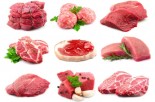Protein is an essential nutrient that your body needs. Many people believe that a high-protein diet (the higher the better) is the best diet. But consuming too much protein isn't healthy at all.
If you are following a high-protein diet, you may think that you need to eat meat as your main source of protein. However, recent studies have indicated that eating too much protein, specifically coming from an animal product, can cause liver damage, heart problems, and weight gain (Healthy Eating). If this type of diet persists, these health problems can turn into serious conditions, potentially leading to disease.
The recommended amount of protein is approximately 10-35% of your daily calories. Adult women need, on average, 46 grams of protein a day, while adult men need about 56 grams (Medicine Net).
In this segment, athletic fitness trainer, Suzanna McGee, debunks the myths about protein. She also breaks down how much dietary protein you should consume and explains how a plant-based, whole foods diet can still give you all the protein you need.
The recommended amount of protein is approximately 10-35% of your daily calories. Adult women need, on average, 46 grams of protein a day, while adult men need about 56 grams (Medicine Net).
In this segment, athletic fitness trainer, Suzanna McGee, debunks the myths about protein. She also breaks down how much dietary protein you should consume and explains how a plant-based, whole foods diet can still give you all the protein you need.




 Suzanna McGee is a former Ms. Natural Olympia drug-free bodybuilding champion and currently a competitive tennis player, athletic fitness trainer and writer. She is also a performance enhancement and injury prevention coach, with a certificate in plant-based nutrition from eCornell University.
Suzanna McGee is a former Ms. Natural Olympia drug-free bodybuilding champion and currently a competitive tennis player, athletic fitness trainer and writer. She is also a performance enhancement and injury prevention coach, with a certificate in plant-based nutrition from eCornell University. 